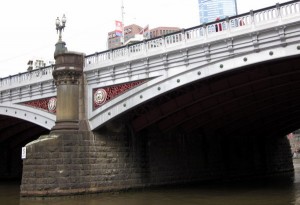![]()
![]()
![]()
![]()
![]()
![]()
jamāra
home. As in,
āl la liēn sū jamāra;
I’m home now.
![]()
![]()
![]()
![]()
![]()
![]()
jamāra
home. As in,
āl la liēn sū jamāra;
I’m home now.
![]()
![]()
![]()
![]()
![]()
![]()
jamīka
bridge.
This word has a curious history. It is related to the stem -ālm- which means across. The word for bridge was originally jālmīke, derived from -ālm- and the suffix for made things -īk-. However, there is a prefix āl- which is an augmentative prefix, and so jālmīke came to be reanalyzed as ‘large’ + -mīk-, which came to mean bridge.
la jamīki nā sū þō jamāonre mē;
There are many bridges in this city.


Detail:

![]()
![]()
![]()
![]()
![]()
![]()
![]()
![]()
![]()
mamōlanen
a woman who has given birth, a mature woman.
![]()
![]()
![]()
![]()
![]()
![]()
anmēλa
This means young, and has connotations of being less than ready. So, it can mean naive or inexperienced when referring to people; immature when referring to the position in the growth cycle of an animal, unripe when referring to fruit, and so forth.
![]()
![]()
![]()
![]()
![]()
![]()
![]()
anmīrīñ
the quality of being timid or shy, of hanging back and waiting for others to lead the way. Again, a neutral quality.
![]()
![]()
![]()
![]()
![]()
![]()
![]()
![]()
![]()
jamārwakie
a sudden good feeling in reaction to something unusual and unexpected; amazement, wonder, surprise.
ē tema jamārwakie aþ ānen anñiñēka tetme jatēmmēri aþ ānen ankewāla ñi sāen rā sāim rā anxūrimma;
He was amazed, and they called to him with eagerness, and with caution he went to them, to their gates.
![]()
![]()
![]()
![]()
![]()
![]()
jamīra
a feeling of immediate dread or fear of the unknown future. So, the person who feels jamīra thinks that something bad and unwanted is going to happen in the near future, but this is uncertain. This differs from jalūta in that it is a stronger feeling and the thing feared or dreaded is less certain. So, one feels jalūta with regards to a known event (it’s happened before), and jamīra with regards to an unknown event.
![]()
![]()
![]()
![]()
![]()
![]()
mamōīñ
a person’s male child, a son of one’s cousins, any male child of the next generation. So, the green triangles in the diagram as related to the purple square:

![]()
![]()
mē
The modifier mē refers to the inside of something. So, rā NP mē is into NP. The expected expression rū NP mē is not used.
![]()
![]()
![]()
![]()
![]()
![]()
rājamē
rājamē is rā NP mē without a specified location, and so means ‘into’. The expected expression rūjamē is not used.